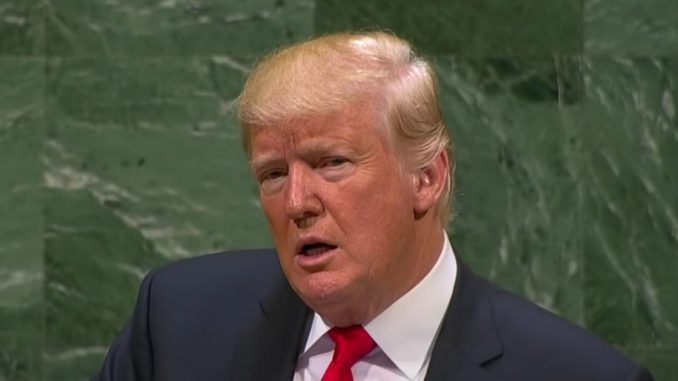
There were many times when former President Donald Trump faced ridicule for making remarks that turned out to be extraordinarily prescient.
During a September 2018 address before the United Nations General Assembly, Trump warned European Union nations they needed to reduce their dependency upon Russia for their energy needs. “Reliance on a single foreign supplier can leave a nation vulnerable to extortion and intimidation,” he said.
He continued: “That is why we congratulate European states such as Poland for leading the construction of a Baltic pipeline, so that nations are not dependent on Russia to meet their energy needs.”
Trump called out Germany specifically. “Germany will become totally dependent on Russian energy if it does not immediately change course.”
In the clip below, the camera pans over to the German delegation. The group reacts to Trump’s warning with eye rolls and chuckle among themselves.
Needless to say, they’re no longer laughing.
Trump and in 2018 he advised Germany and the European Union to find quick energy solutions instead of relying on Russia, but the German delegation was laughing at Trump's words and mocking him
America lost a strong and intelligent president#UkraineRussianWar#Oil#Ukraine️ pic.twitter.com/r8kc5hCGy0— 🇸🇦 م . مبارك عبدالله إبن نادر 🇸🇦 (@Bin__Nader) March 9, 2022
Trump’s full address can be viewed below.
Trump understood where the world was headed. He saw that much of the Western world was dependent upon the raw materials and energy supplied by countries that were run by dictators and despots. He knew that reliance upon these hostile regimes for a nation’s energy needs meant yielding a certain amount of control to them and that the degree of control varied in direct proportion to the level of reliance.
Trump chose not to give hostile actors power over the U.S., especially when he was the president of an energy rich country. Understanding how essential energy independence is to national security, he wisely set out to achieve it.
As we assess the geopolitical situation in March 2022, it’s clear that Trump had been right.
Had President Joe Biden been strong enough to resist the far-left wing of his party, his administration would not have declared war on fossil fuels at a time when the renewable energy industry is still in its infancy. It will take years for alternative energy sources to be able to power the U.S. economy.
According to the U.S. Energy Information Administration, “renewable energy sources accounted for about 12.6 percent of total U.S. energy consumption and about 19.8 percent of electricity generation” in 2020.
The left’s green energy dream is simply not possible yet.
If Biden had stayed the course, he wouldn’t have had to humiliate himself and America by begging foreign leaders who hate us to pump more oil. And he would be able to export oil to help out our friends in Europe.
Moreover, oil prices would be lower. This administration’s failed energy policies had already caused a steep run-up in energy costs.
Biden officials are calling the rise in oil prices since Russia’s invasion of Ukraine the “Putin price hike.” They don’t mention the “Biden price hike” that preceded it.
On Nov. 6, 2020, WTI closed at $37.14 a barrel. By Jan. 20, 2021, the day of Biden’s inauguration, prices had risen to $53.30 as markets braced for his administration’s coming war on fossil fuels. The price rose steadily throughout the year, topping out at $83.57 on Oct. 29.
The buildup of Russian troops along the Ukrainian border forced prices even higher, and the actual invasion caused prices to explode.
Germany, whose delegates mocked Trump’s 2018 warning, continued to import enormous quantities of oil and gas from Russia, more so than any other EU nation.
This left German leaders flatfooted when Russian President Vladimir Putin invaded Ukraine two weeks ago.
Worried that Russia might cut off the flow of energy their nation depended on, German Chancellor Olaf Scholz was initially reluctant to throw his full support behind Ukraine.
Ultimately, however, he bit the hand that feeds him.
In a stunning Feb. 26 speech, Scholz announced he would raise Germany’s defense expenditures up to the NATO-recommended target of two percent of GDP, send 1,000 anti-tank weapons and 500 Stinger missiles to the Ukrainian military and would start (slowly) transitioning his country away from its reliance on Russian natural gas. He also agreed to support the EU’s proposal to ban Russia from the SWIFT international payment system.
The Russian invasion of Ukraine has highlighted just how intimately energy policy is intertwined with national security.
Sadly, the lesson appears to be lost on the Biden administration, who has signaled they will use the crisis as an opportunity to transition to green energy.
God help us.
